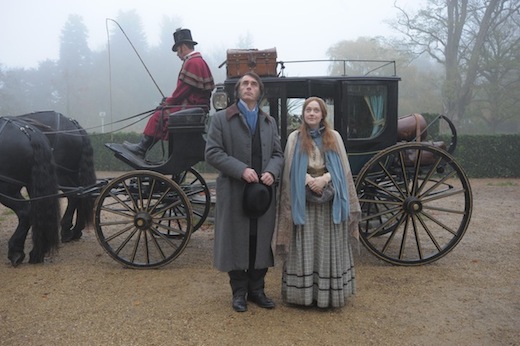Effie Gray, which has been written by Emma Thompson and recounts the doomed marriage of Victorian art critic John Ruskin to his teenage bride (he refused to consummate it), has a blissful cast. It stars Dakota Fanning, Ms Thompson herself, plus Julie Walters, David Suchet, Greg Wise, James Fox, Derek Jacobi and Robbie Coltrane. So it is period drama heaven, in this respect. It’s a cast you could watch all day, whatever, which is handy, as this is probably quite dull otherwise. It is adequate. It does the job. It gets us from A to B. But it feels as if it is missing something crucial, and I don’t just mean a stiffie. It also doesn’t deliver emotionally.
Ruskin (Wise) had known Euphemia ‘Effie’ Gray (Fanning) ever since she was a little girl, had wooed her from when she was 12, and married her when she was 19, immediately taking her from her native Scotland to live with his parents (Walters and Suchet) in Denmark Hill. His parents are wonderfully vile, like grotesque Roald Dahl characters before their time. They dote on John, their only son, deem him extraordinarily special, cannot accept a daughter-in-law, and basically tell a bewildered Effie to Effie Off. I could watch Walters and Suchet being wonderfully vile not just all day, but all week, which presents something of a problem: whenever they are not on screen, you long for them to return. Yes, yes, yes, but can we now go back to Denmark Hill? I suspect such roles are a walk in the park for Walters and Suchet, but that doesn’t make them any less enjoyable.

Meanwhile, poor Effie. Poor, poor Effie. She wishes only to be a good wife, as dictated by the mores of the day. She wants to care for John, support him in his work, darn his socks, have his children, but is cruelly rejected at every turn. On their wedding night, when she drops her nightgown, he immediately marches from the bedroom, past her naked body, and that is that, for the full five years of their marriage. (The eventual annulment was the talk of Victorian society; a splendidly juicy no-sex scandal.)
Directed by Richard Laxton, Effie Gray is in no great rush. Indeed, the action almost grinds to a halt at certain points — can we now go back to Denmark Hill?; can we? — as the piano valiantly tinkles on. This is probably the nature of the beast but, still, you’d occasionally like to beat it with a broom, while imploring: ‘Get on with it! We’ve got homes to go to!’ The script is intelligent and witty, as you’d expect from Ms Thomson, but rather sparse. Increasingly lonely and melancholic, Ms Fanning must do most of her emoting with her eyes, which are often red-rimmed or welling up or, for special, extra sadness, both. Her sexual frustration explodes only the once, when she lunges for her husband’s penis …in the drawing room! But that was rather out of character, thankfully, as it’s not something anyone would wish to make a habit of. Eventually, though, she finds a confidante in the form of Lady Eastlake (Thompson), wife of the president of the Royal Academy (Fox), and romance in the form of another man. This is Ruskin’s protégé, the painter John Everett Millais (Tom Sturridge, who was not named above, as he is not a prerequisite for period drama heaven, but is welcome all the same.)
The trouble is, the film is as stifled and repressed as the emotions it is attempting to describe, and cannot make a go of the romantic element, which simply refuses to fly. You will want it to fly. You would consider it your reward if it did fly. But it won’t. There is, alas, no sexual chemistry between Effie and Millais. Not a squeak, not a peep, not a whisper. They take a trip to Scotland, with Ruskin; a trip that should be suffused with yearning and longing and the possibility of actual sex (yay!) but instead feels like what it is: a wet week in a cramped cottage in the Highlands. Plus, there is no attempt to read anyone’s character. Why did Effie marry Ruskin? Why did Ruskin marry Effie? Why did he refuse to have sex with her? (Pubic hair looms fantastically large in one of the theories, if you read around.) But here we just don’t understand. And if we don’t understand motivation, what people want, where they are coming from, where they wish to go, how is it possible to care? Or feel anything? The ending is overwrought — Mills & Boonish, even — but there is never any sense that the film has earned it.
So, worth watching for the cast, and the bonnets and cloaks and corsets and all the rest, but it ultimately fails to deliver where it most matters, and I don‘t just mean …yeah, yeah, yeah.
Got something to add? Join the discussion and comment below.
Get 10 issues for just $10
Subscribe to The Spectator Australia today for the next 10 magazine issues, plus full online access, for just $10.
You might disagree with half of it, but you’ll enjoy reading all of it. Try your first month for free, then just $2 a week for the remainder of your first year.













Comments
Don't miss out
Join the conversation with other Spectator Australia readers. Subscribe to leave a comment.
SUBSCRIBEAlready a subscriber? Log in